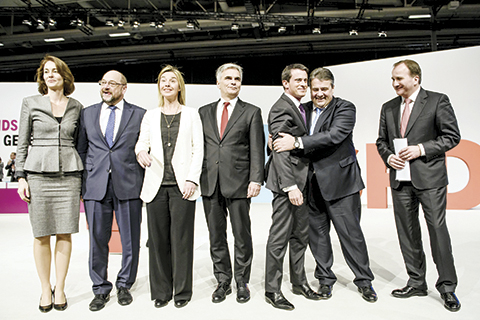 (LtoR) German social democratic party SPD Secretary General Katarina Barley, European Parliament President Martin Schulz, European Union High Representative for Foreign Affairs and Security Policy Federica Mogherini, Austrian Chancellor Werner Faymann, French Prime minister Manuel Valls, SPD leader, German Vice Chancellor, Economy and Energy Minister Sigmar Gabriel and Sweden's Prime Minister Stefan Lofven pose at the SPD annual federal congress in Berlin on December 12, 2015. AFP PHOTO / CLEMENS BILAN
(LtoR) German social democratic party SPD Secretary General Katarina Barley, European Parliament President Martin Schulz, European Union High Representative for Foreign Affairs and Security Policy Federica Mogherini, Austrian Chancellor Werner Faymann, French Prime minister Manuel Valls, SPD leader, German Vice Chancellor, Economy and Energy Minister Sigmar Gabriel and Sweden's Prime Minister Stefan Lofven pose at the SPD annual federal congress in Berlin on December 12, 2015. AFP PHOTO / CLEMENS BILANBERLIN: The United States has asked Germany for more military help in the fight against Islamic State, a German magazine reported yesterday, a week after parliament approved a plan to join the campaign in Syria. Der Spiegel said US Defense Secretary Ashton Carter had sent a letter asking for a bigger military contribution from Berlin.
Its mission currently includes six Tornado reconnaissance jets, a frigate to protect the French aircraft carrier Charles de Gaulle, refuelling aircraft and up to 1,200 troops. The deployment is a direct response to a French appeal for solidarity after militant attacks in Paris killed 130 people. Germany does not plan to carry out air strikes in Syria.
A German Defence Ministry spokesman confirmed a letter had been received from the United States and its content was under consideration, giving no further details. Germany has over the last two years shown a growing readiness to commit troops to foreign missions.
Defence Minister Ursula von der Leyen said last week Germany might need bigger armed forces to cope with the more assertive role. She said an analysis into staffing and the organization of combat forces would report in a couple of months on whether personnel levels were appropriate.
More than 3,000 personnel are currently deployed overseas and the Syria mission will raise that by up to 1,200. Von der Leyen also wants to send 650 troops to Mali to help the French campaign against Islamist militants there. Germany last year started arming Iraqi Kurds fighting Islamic State.
Refugee stance
German Chancellor Angela Merkel defended her open-door policy on refugees in an interview published yesterday ahead of a key party congress and an EU summit likely to see her stance come under fire. Merkel said she was working on reducing the number of migrants coming to Europe's biggest economy, which is bracing for the expected arrival this year of one million people fleeing war and poverty.
However she added that "it's illusory to believe that the problem of refugees can be resolved at the German-Austrian border. "The large movements of refugees can only be resolved through international cooperation," Merkel told the Augsburger Allgemeine newspaper.
And she urged improved protection of the EU's external borders, as well as increased cooperation with Turkey from where most of the Syrians fleeing their country's four-year conflict set off across the Mediterranean. Merkel also reiterated the need to preserve Europe's passport-free Schengen zone. "We all value the free movement of people, goods and services. And no country in Europe needs that like Germany.
"But it can only function long-term if the external borders of the EU are protected," she said, ahead of an EU summit Thursday and Friday. The German chancellor's sudden move in early September to unconditionally welcome asylum seekers from Syria created a rift within the EU, where some countries accused her of exercising a "pull" effect on migration.
As the migrant flow swelled, several countries within the Schengen area, including Germany, reintroduced border checks, raising fears for the future of free movement with the 26-country bloc. Merkel will also seek to stamp out dissent in her conservative Christian Democratic Union over the record refugee influx at a party congress tomorrow.-Agencies









